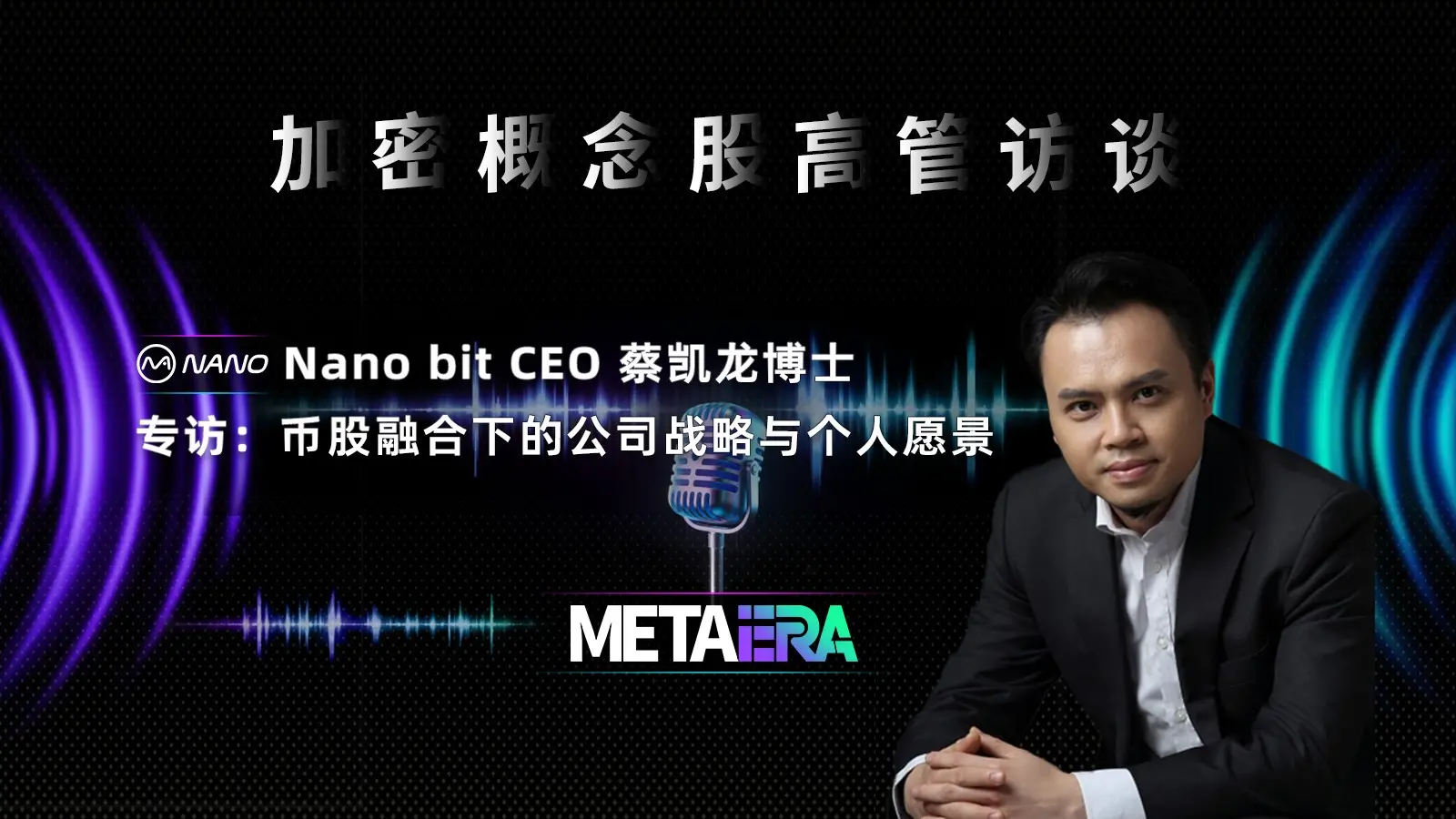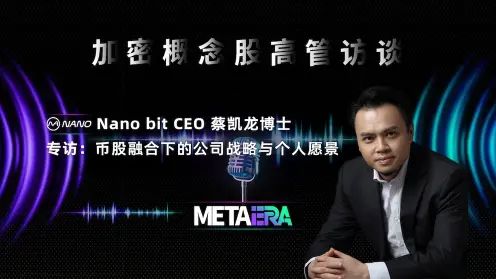Article Author: 0x9999in1
Source: MetaEra
The Web3 strategies and layouts of publicly listed companies have become a hot topic of increasing public interest. Against this backdrop, MetaEra officially launched the “Executive Interviews with Crypto Concept Stocks” series. We will engage in conversations with those business leaders who dare to lead in the wave of digital transformation, delving into their strategic layouts, business innovations, and financial innovations from the first-person perspective of decision-makers, providing forward-looking insights for industry participants.

As the first interview in this series, MetaEra conducted an in-depth interview with Dr. Cai Kailong, CEO of Nano bit HK, focusing on the theme of “Strategic Transformation and Layout of Listed Companies under the Trend of Integration between Traditional Finance and Cryptocurrency.” As a leading figure with profound experience in both traditional finance and the cryptocurrency field, Dr. Cai shared the opportunity to join Nano Labs [NASDAQ: NA], insights on the trend of “coin-stock” integration, the strategic planning of Nano bit HK, and his vision as a bridge between the crypto world and Wall Street.
On July 17, 2025, Dr. Cai Kailong joined Nano Labs as CEO of Nano bit HK, which he views as a personal decision made in response to the prevailing trends. He believes that the deep integration of cryptocurrency and traditional finance is advancing at an unprecedented speed. Cryptocurrency giants are flocking to the U.S. capital markets, while traditional financial institutions are actively participating in the crypto space through ETFs, funds, and stock securitization, showcasing a two-way engagement between the crypto world and Wall Street.
Dr. Cai is in strong agreement with Dr. Kong Jianping, Chairman of Nano Labs, regarding this trend. Five years ago, his doctoral thesis in finance focused on the relationship between Bitcoin and U.S. stocks, predicting various scenarios of their integration. This forward-looking vision has led him to consistently adopt a unique investment strategy of half U.S. stocks and half cryptocurrencies while managing cryptocurrency funds. With rich experience in traditional finance (such as Wall Street investment banks and Deutsche Bank) and cryptocurrency (such as Huobi Group), his joining of Nano Labs seems a natural progression. He believes that Nano Labs, as a publicly listed blockchain company in Asia, demonstrates keen insight into industry trends through its transformation from chip design to cryptocurrency strategic reserves.
In Dr. Cai’s view, the surge in “coin-stock” integration stems from significant changes in the regulatory environment. After Trump took office, the U.S. attitude towards cryptocurrency underwent a 180-degree shift, with changes in SEC leadership and Congress passing several crypto-friendly bills, while Hong Kong also increased its support for virtual assets. These changes have eliminated long-standing regulatory barriers that suppressed market demand, triggering explosive growth in the “coin-stock” concept. However, he cautions investors that this trend inevitably contains bubbles and mixed elements. Some companies may chase trends merely to save their stock prices, lacking a foundation for long-term strategy.
Dr. Cai categorizes listed companies participating in “coin-stock” integration into three types:
Native crypto companies: Strongly related to cryptocurrencies and blockchain, enhancing compliance and influence through listing;
Transformative companies: Leaders with foresight actively transforming to integrate into the crypto space;
Trend chasers: Companies with poor main business performance attempting to save stock prices through cryptocurrency.
Regarding tokenized stocks, Dr. Cai points out that this is not a new concept. As early as 2020 and 2021, FTX, Binance, and the Mirror Protocol launched tokenized products for U.S. stocks. The recent attention on Robinhood’s tokenized stock business is due to its status as a globally compliant brokerage and its influence among young users. However, OpenAI’s accusations against Robinhood for unauthorized actions reveal that tokenized stocks touch on the interests of unlisted super unicorns—the circulation of tokenized stocks may weaken these companies’ pricing dominance in future financing. Additionally, tokenized stocks face regulatory challenges such as KYC, taxation, custody, and stock definition, making their development prospects full of challenges.
Interestingly, Dr. Cai describes the “coin-stock M7” concept proposed by MetaEra as “seven sharp knives” inserted into traditional finance by the cryptocurrency world. These companies, with strong capabilities, compliant operations, and excellent talent, become industry pioneers, seizing discourse power and leading subsequent companies into this field. For example, Strategy (formerly MicroStrategy) achieved a tenfold increase in stock price through its Bitcoin strategic reserves, setting an example for other companies.
Regarding the future of Nano bit HK, Dr. Cai stated that the company is already the world’s leading publicly listed crypto asset reserve platform centered on BNB. He believes that while Bitcoin strategic reserves remain mainstream, their returns are no longer as attractive as other cryptocurrencies. BNB is more appealing due to its diverse sources of income (such as staking, airdrops, etc.).
Nano bit HK’s strategy includes:
Expanding BNB reserves: Increasing BNB reserve scale through continuous fundraising;
Deepening institutional cooperation: Collaborating with major institutions in the BNB ecosystem to develop more sources of income;
Based in Hong Kong, facing the world: Leveraging Hong Kong’s unique advantages in stablecoins and virtual assets to promote industry development.
Dr. Cai emphasized that he will leverage his experience in traditional finance and cryptocurrency, particularly his expertise in financing, asset management, and risk control, to ensure the company achieves its strategic goals. Nano bit HK will also utilize Dr. Kong Jianping’s industry influence and compliance experience in Hong Kong to contribute to the development of the virtual asset ecosystem in Hong Kong.
At the end of the interview, Dr. Cai mentioned his personal vision. When he joined Huobi in 2017, he brought talent from Wall Street into the crypto world, helping the industry transition from grassroots to professionalism. Now, he hopes to reverse this trend by bringing talent from the crypto world into Wall Street, aligning with the trend of cryptocurrency companies pursuing compliance and listing. He pointed out that many cryptocurrency companies currently choose to develop or list in the U.S., reflecting the industry’s strong pursuit of compliance. Dr. Cai hopes to continue playing the role of a bridge between the crypto world and Wall Street through the platform of Nano bit HK, promoting deep integration between the two, bringing talent from the crypto world into the compliant financial circle represented by Wall Street, and injecting momentum into the long-term development of the cryptocurrency industry.
ChainCatcher reminds readers to view blockchain rationally, enhance risk awareness, and be cautious of various virtual token issuances and speculations. All content on this site is solely market information or related party opinions, and does not constitute any form of investment advice. If you find sensitive information in the content, please click “Report”, and we will handle it promptly.
